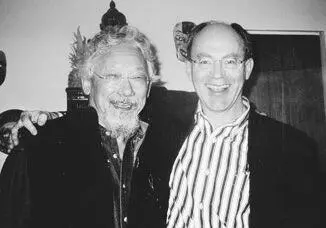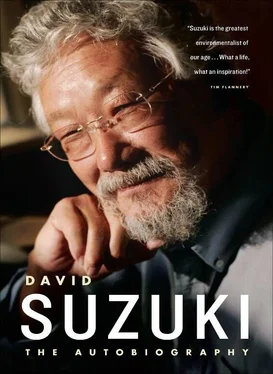
Sharing a joke with Gerry Scott when he was director of climate change work with the David Suzuki Foundation
This strategy worked. Using government data, the doctors and scientists Catherine commissioned produced a report entitled “Taking Our Breath Away.” It found that air pollution, much of it from burning fossil fuels, was prematurely killing sixteen thousand Canadians a year. A plane crash killing all occupants is a great tragedy, but imagine a full jumbo jet crashing in Canada every week: you get an idea of the magnitude of these preventable fossil fuel — induced deaths from pollution.
And every fatality is just the tip of an immense iceberg. For every death, there are many more serious lung problems requiring hospitalization, including surgery. For each hospitalization, there are many more days lost from school or work, then many more with reduced productivity because of low-grade problems of bronchitis and asthma.
“Taking Our Breath Away” was the first DSF report to be translated into Canada's other official language, French, as “À couper le souffle.” Doctors recognized the significance of the report, and English- and French-speaking physicians supported our call to reduce air pollution. Federal and provincial medical societies also signed on to our initiative to reduce greenhouse gas emissions for health reasons.
One of the first people to buy in was Dr. David Swann, chief health officer for the province of Alberta. I was stunned when he was fired for taking this position. This is Canada, yet here was Alberta behaving like some tin-pot government vindictively punishing a public servant for deviating from the government line. Dr. Swann fought back and eventually won reinstatement, but he soon left public service in the province. Taking a stand on climate change in Alberta took courage.
In concert with other organizations, Gerry commissioned papers that looked at the impact of climate change on Canada's national parks. Jay Malcolm, a forestry professor at the University of Toronto, concluded that global warming would dismantle the species balance of our most prized parks: some species could adapt to higher temperatures, but others would have to move to remain within a viable range.
A 2004 DSF study, “Confronting Climate Change in the Great Lakes Region,” looked at the hydrological implications of climate change on lakes Superior, Michigan, Erie, Huron, and Ontario, which constitute the largest area of fresh water on Earth. The report concluded that the effects would be catastrophic.
The Nature of Things with David Suzuki did a series of programs on global warming, including a two-hour special. Polls showed that Canadians were becoming increasingly concerned about climate change, and I like to think that both the David Suzuki Foundation and The Nature of Things played an important part in increasing that awareness and concern.
The evidence of climate change is now overwhelming, and to me nothing is more compelling than the cover story in the conservative National Geographic magazine in September 2004. Presented on a foldout page, the 400,000-year record of carbon dioxide concentrations in the atmosphere, teased from the Antarctic ice by researchers, reveals a curve that in about 1990 suddenly soars above the highest level found in all that time. That curve then leaps straight up.
But personal observations, even if anecdotal and not statistically significant, are compelling too. When Tara and I camped above the Arctic Circle in June 2005, we saw and heard firsthand evidence of shrinking glaciers, melting permafrost, and newly arrived plant and animal species. Arctic peoples speak of global warming as a well-established fact that has changed their habitat and already threatens their way of life.
Yet, despite the overwhelming consensus of climatologists and the most painstaking assessment of scientific literature in history, in 2005 the media continued to treat climate change as if it is a controversy, as if there is still doubt. They give far more space than is warranted to the small number of “skeptics” who deny global warming is occurring. This is tragic.
Accepting that the danger is real, society can look for solutions. Reducing greenhouse gas emissions means buying time to switch to alternative, nonpolluting energy sources and enjoying the direct benefits of a cleaner environment, better health, and the conservation of valuable, nonrenewable fossil fuels. If by some miracle the crisis passes, those nonrenewable fossil fuels will still be there, our homes and businesses will be more efficient, and our environment will be cleaner. Acting on climate change is a win-win situation, whereas doing nothing will make the corrective measures much more difficult, much more expensive, and perhaps too late.
After the Earth Summit in Rio in 1992, an intergovernmental negotiating committee was established to meet and work out a framework within which the climate convention could be assessed. In 1995, the Conference of the Parties (cop) to the United Nations Framework on Climate Change was established to meet annually in a different country. At the meetings, terms of the protocol were refined, progress assessed and scientific information updated. The first cop meeting in North America was held in Montreal from the end of November to early December 2005.
Thousands of delegates, NGO participants and press attended, and DSF was a prominent participant. In addition to ten staff members, eight board members took part in the meetings in different capacities. Staff worked diligently to make our position known: the Kyoto process must carry on, emissions in the industrialized nations should be cut by 25 percent by 2020 and 80 percent by 2050 if we are to minimize the consequences of the buildup of greenhouse gases. It was gratifying to see that there was no longer a debate about whether climate change is happening or whether we should reduce our emissions. The big questions were how, and how much by when.
Stephen Bronfman, as a board member, sponsored a breakfast for businesspeople concerned about climate change. More than four hundred people attended to hear another board member, Ray Anderson. As a very successful businessman, Ray could speak to the audience as one of them and his message of “doing well by doing good” resonated strongly with the audience.
Soon after being elected, George W. Bush indicated that he would not ratify Kyoto and wanted to ignore the entire process. By the Montreal meetings, the Protocol had been ratified by enough countries to make it international law. The large U.S. delegation in Montreal had no official status but actively worked to derail the Kyoto Protocol as a failure and to recruit other countries to its plan to seek new, cleaner technologies that would reduce the need to cut back on fossil fuel use. As representatives of the most powerful nation on Earth, the U.S. contingent had a lot of clout, but the country is also the world's biggest emitter of greenhouse gases and therefore has a big responsibility, as Prime Minister Paul Martin stated in his opening address. In the end, despite the American pressure, the rest of the world united to back the Kyoto process and continue the path toward much deeper cuts. It was a crowning achievement for the delegates and may very well be looked back upon as a watershed moment.
MANY OF US IN the David Suzuki Foundation cut our teeth on battles over the future of British Columbia's forests. From South Moresby and Stein Valley to the Khutzeymateen and Clayoquot Sound, one forest after another in pristine areas had become threatened, sparking a public outcry. It seemed natural for the DSF to be involved in forestry issues.
Читать дальше



![David Jagusson - Devot & Anal [Hardcore BDSM]](/books/485905/david-jagusson-devot-anal-hardcore-bdsm-thumb.webp)









